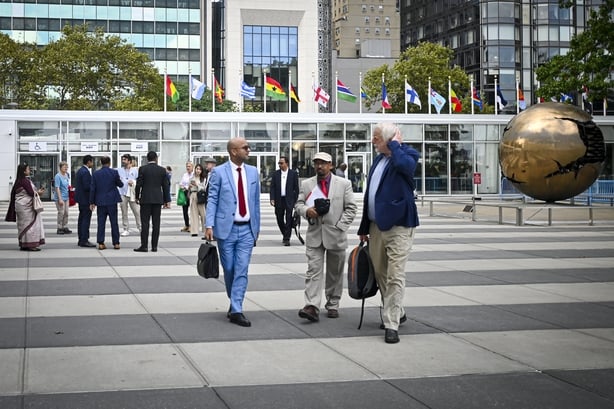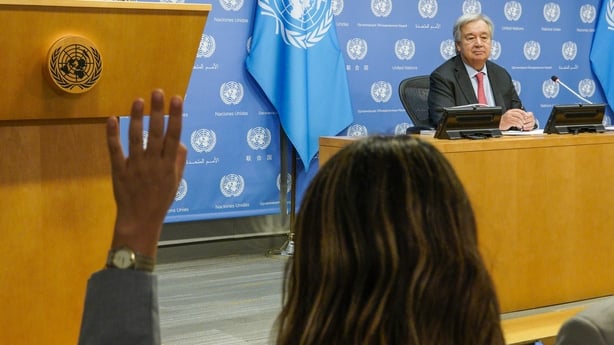A major summit kicks off tomorrow to mark the half way point to 2030. That's the year the UN’s Sustainable Development Goals were supposed to have been reached.
The 17 goals, known as the SDGs, are crucial to the survival of humanity, the UN says, but admits that seven years out, they are way off track.
The UN's Deputy Secretary-General, Amina Mohammed, told reporters that at the midpoint to have only 15% of the targets on the right path was "abysmal" and a "sobering fact" ahead of the summit.
If you don’t really know what the SDGs are, you’re not alone.
When I approached UN staff at the agency’s headquarters in New York, many struggled to name more than a handful of the 17 goals, comprising 169 targets, set by world leaders 2015, to protect the planet and life on it.
Over the years, the agenda has been criticised for being too broad and ambitious.
I was asking the wrong question, according to Imme Scholz, from the Independent Group of Scientists that helped come up with the SDGs in the first place.
"People around the world were asked what they need for a good life," she told RTÉ News, "and all these points emerged."

So, what are they?
Here is a handy list: no poverty, zero hunger, good health and wellbeing, quality education, gender equality, clean water and sanitation, affordable and clean energy, decent work and economic growth, industry innovation and infrastructure, reduced inequalities, sustainable cities and communities, responsible consumption and production, climate action, life below water, life on land, peace justice and strong institutions, partnerships for the goals.
They are the lofty ideas that member states were happy to sign up to seven years ago.
But now, the 2030 agenda is not going well.
A UN report published this week found that at the midpoint to 2030, it looks like the goals are extremely unlikely to be reached on time.
If anything, they are sliding backwards, especially on tackling poverty, food insecurity, gender equality and reducing the use of fossil fuels, the report found.
Progress has been set back in recent years due to the lingering drag of the Covid-19 pandemic, the highest level of armed conflict globally since 1945, and climate related disasters as well as inflation and the rising cost of living, according to Astra Bonini from the UN’s Department of Economic and Social Affairs (DESA).
"Without urgent course correction and acceleration, humanity will face prolonged periods of crisis and uncertainty – triggered by and reinforcing poverty, inequality, hunger, disease, conflict and disaster," the report states.
To correct the course, the UN Secretary General, António Guterres, said UN members states needed to surge forward on the SDGs. Otherwise, the whole agenda risks becoming an "epitaph for a world that might have been," he said.
How well do you know the Sustainable Development Goals? A major summit on the SDGs will take place during UN General Assembly Week - with the crucial targets set by world leaders in 2015 way off track.
— RTÉ News (@rtenews) September 17, 2023
Read more: https://t.co/BNBFEGjWJD #UNGA #UNGA2023 #SDGSummit pic.twitter.com/rZz5nd5nLE
This year, Ireland was appointed, along with Qatar, to undertake the role of co-facilitator for the SDGs.
Their job was to whip up support for the agenda and get the UN's 193 member states to renew their commitment.
They were aiming for consensus on a political statement, due to be delivered, in part, by the Taoiseach at the opening of the SDG Summit on Monday.
But it was no easy task.
"The number of moving parts in negotiations is immense," Fergal Mythen, Ireland’s ambassador to the United Nations told RTÉ News.
He is a relative newcomer to the UN system, Ambassador Mythen told RTÉ News, but his experience of delicate negotiations in Northern Ireland came in useful, he said.
"My co-facilitator, the Qatari Ambassador Alya al-Thani and I spent the last eight months working through these issues, trying to find a balance that would be acceptable to all, but also be ambitious and help accelerate SDG implementation," he said.
There were a number of sizeable hurdles along the way. Some member states objected to references to reproductive rights and sexual and gender-based violence. So, the language had to be dropped. A commitment to end violence against women and girls remained.
Another serious sticking point concerned reform of the international institutions, like the World Bank and IMF which hold the key to much of the financing for SDGs in the developing world.
Reform of the international financial architecture which saddles the developing world with crippling debt was high on the agenda for the Global South.
But the US and UK disagreed with a plan to give the UN greater responsibility for reform of the multilateral financial institutions, arguing that it should come from within.
That didn’t please representatives from the developing world.
After that hurdle was cleared through compromise wording, another presented itself.

At the eleventh hour, Russia, Bolivia, Nicaragua, Cuba and a few others wanted the statement to highlight the impact on development of "unilateral coercive measures," meaning sanctions.
Their demands weren’t met this time, but it’s unlikely to be the last negotiators have heard of it. At a news conference ahead of the summit, the UN chief, António Guterres, said that it was his "most important objective" next week, to see a "quantum leap" on SDG implementation.
He said he would be calling on the world’s wealthiest nations to commit to a $500bn SDG stimulus package. On that, he might be disappointed.
And with other matters slated for UN General Assembly week – notably a visit by the Ukrainian leader Volodymyr Zelensky, a climate summit, as well as high level discussions on pandemic prevention – the 2030 Agenda will be competing for attention.







